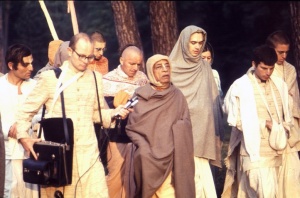SB 8.9.3: Difference between revisions
(Vanibot #0018 edit: make synonym terms in Sanskrit italic in SB - Vanisource) |
(Vanibot #0054 edit - transform synonyms into clickable links, which search similar occurrences) |
||
| Line 23: | Line 23: | ||
<div class="synonyms"> | <div class="synonyms"> | ||
''kā'' | ''[//vanipedia.org/wiki/Special:VaniSearch?s=kā&tab=syno_o&ds=1 kā]'' — who; ''[//vanipedia.org/wiki/Special:VaniSearch?s=tvam&tab=syno_o&ds=1 tvam]'' — are You; ''[//vanipedia.org/wiki/Special:VaniSearch?s=kañja&tab=syno_o&ds=1 kañja]-[//vanipedia.org/wiki/Special:VaniSearch?s=palāśa&tab=syno_o&ds=1 palāśa]-[//vanipedia.org/wiki/Special:VaniSearch?s=akṣi&tab=syno_o&ds=1 akṣi]'' — having eyes like the petals of a lotus; ''[//vanipedia.org/wiki/Special:VaniSearch?s=kutaḥ&tab=syno_o&ds=1 kutaḥ]'' — from where; ''[//vanipedia.org/wiki/Special:VaniSearch?s=vā&tab=syno_o&ds=1 vā]'' — either; ''[//vanipedia.org/wiki/Special:VaniSearch?s=kim&tab=syno_o&ds=1 kim] [//vanipedia.org/wiki/Special:VaniSearch?s=cikīrṣasi&tab=syno_o&ds=1 cikīrṣasi]'' — what is the purpose for which You have come here; ''[//vanipedia.org/wiki/Special:VaniSearch?s=kasya&tab=syno_o&ds=1 kasya]'' — of whom; ''[//vanipedia.org/wiki/Special:VaniSearch?s=asi&tab=syno_o&ds=1 asi]'' — do You belong; ''[//vanipedia.org/wiki/Special:VaniSearch?s=vada&tab=syno_o&ds=1 vada]'' — kindly tell us; ''[//vanipedia.org/wiki/Special:VaniSearch?s=vāma&tab=syno_o&ds=1 vāma]-[//vanipedia.org/wiki/Special:VaniSearch?s=ūru&tab=syno_o&ds=1 ūru]'' — O You whose thighs are extraordinarily beautiful; ''[//vanipedia.org/wiki/Special:VaniSearch?s=mathnatī&tab=syno_o&ds=1 mathnatī]'' — agitating; ''[//vanipedia.org/wiki/Special:VaniSearch?s=iva&tab=syno_o&ds=1 iva]'' — like; ''[//vanipedia.org/wiki/Special:VaniSearch?s=manāṁsi&tab=syno_o&ds=1 manāṁsi]'' — within our minds; ''[//vanipedia.org/wiki/Special:VaniSearch?s=naḥ&tab=syno_o&ds=1 naḥ]'' — our. | ||
</div> | </div> | ||
Latest revision as of 23:37, 18 February 2024

A.C. Bhaktivedanta Swami Prabhupada
TEXT 3
- kā tvaṁ kañja-palāśākṣi
- kuto vā kiṁ cikīrṣasi
- kasyāsi vada vāmoru
- mathnatīva manāṁsi naḥ
SYNONYMS
kā — who; tvam — are You; kañja-palāśa-akṣi — having eyes like the petals of a lotus; kutaḥ — from where; vā — either; kim cikīrṣasi — what is the purpose for which You have come here; kasya — of whom; asi — do You belong; vada — kindly tell us; vāma-ūru — O You whose thighs are extraordinarily beautiful; mathnatī — agitating; iva — like; manāṁsi — within our minds; naḥ — our.
TRANSLATION
O wonderfully beautiful girl, You have such nice eyes, resembling the petals of a lotus flower. Who are You? Where do You come from? What is Your purpose in coming here, and to whom do You belong? O You whose thighs are extraordinarily beautiful, our minds are becoming agitated simply because of seeing You.
PURPORT
The demons inquired from the wonderfully beautiful girl, "To whom do You belong?" A woman is supposed to belong to her father before her marriage, to her husband after her marriage, and to her grown sons in her old age. In regard to this inquiry, Śrīla Viśvanātha Cakravartī Ṭhākura says that the question "To whom do You belong?" means "Whose daughter are You?" Since the demons could understand that the beautiful girl was still unmarried, every one of them desired to marry Her. Thus they inquired, "Whose daughter are You?"